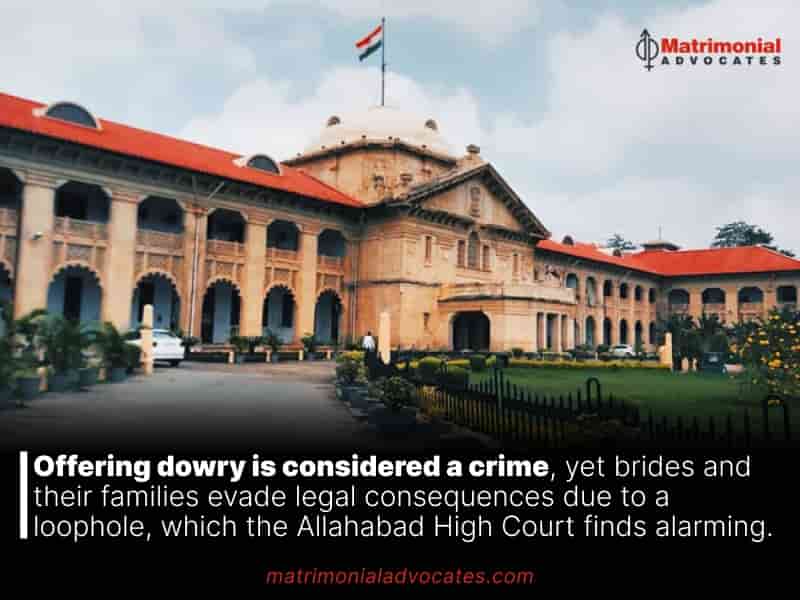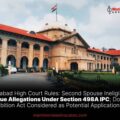
In a recent judgment, the Allahabad High Court clarified the provisions of the Dowry Prohibition Act of 1961 and the Uttar Pradesh Dowry Prohibition Rules of 1999. The court highlighted a troubling pattern where grooms and their families are prosecuted under Section 3 of the Dowry Prohibition Act, 1961, solely based on statements provided by the bride and her family. However, a legal impediment under Section 7(3) prevents any action against the bride and her family for their participation in dowry exchange, despite it being an offense under Section 3 of the Act.
Section 7(3) of the Dowry Prohibition Act, 1961 provides that “Notwithstanding anything contained in any law for the time being in force a statement made by the person aggrieved by the offence shall not subject such person to a prosecution under this Act.”
Justice Vikram D. Chauhan stressed that individuals cannot be prosecuted solely based on statements regarding dowry exchange but are still considered offenders under Section 3 of the Act. The Court found it unjust to rely solely on the testimony of the dowry giver, emphasizing the need for additional evidence such as income sources and disclosures under the Income Tax Act to support dowry allegations.
The Court highlighted a disparity in punishment between demanding dowry, punishable by up to 2 years, and receiving dowry, which carries a minimum punishment term. It warned against potential false accusations from the bride and her family aimed at ensuring the prosecution of the groom and his family with the more severe punishment, particularly in the absence of corroborative evidence.
According to Rule 10 of the Uttar Pradesh Dowry Prohibition Rules, 1999, parties to a marriage must submit a list of received gifts to the Dowry Prohibition Officer within a month of the marriage, as per the Dowry Prohibition (Maintenance of Lists of Presents to the Bride and Bridegroom) Rules, 1985. Rule 6(8) mandates the Dowry Prohibition Officer to record these lists in a register maintained for this purpose.
The Court expressed concern over a trend where cases lacked proper documentation required by the Act or Rules, with authorities failing to enforce compliance. Despite the obligation to maintain lists under the Dowry Prohibition Rules, Investigating Officers were neglecting this requirement when registering FIRs under the Act.
“If the aforesaid list is maintained then it would assist the investigating officer as well as courts to assess as to which of presents during marriage would come in the exception provided under Section 3 of the Dowry Prohibition Act. Prima facie, this Court feels that the Dowry Prohibition Officer are not following the direction of law as they are not ensuring that the provisions of the Dowry Prohibition Act and Rules framed there under are followed in letter and spirit by parties to marriage.”Top of Form
The Court stressed the importance of the Government Order dated 17.05.2024, which mandated the submission of a list of wedding gifts according to the 1985 Rules at the time of marriage registration. This measure was seen as pivotal in combating dowry practices, aiming to prevent unfair implications of the groom and his family in post-marriage matrimonial disputes.
Pointing out Rule 5 (5) A of the 1999 Rules, the Court highlighted that it required the Chief Dowry Prohibition Officer to instruct all state government departments, making it mandatory for every government employee to disclose their marriage to their department head, confirming the absence of dowry acceptance.
Taking these regulations into account, on 16.02.2024, the Director of Women Welfare issued directives to various government departments to adhere to Rule 5 (5) A of the 1999 Rules and marked 26th November as “Dowry Prohibition Day.”
In line with Rule 6(1) of the 1999 Rules, the Court emphasized the responsibility of the Dowry Prohibition Officer to raise awareness about the dangers of dowry through various media channels and community engagement, with the goal of curbing associated atrocities. Despite the enactment of the Dowry Prohibition Act in 1961, the Court observed a slow eradication of dowry practices.
Reviewing the procedural aspects, the Court referred to Rule 7 and Rule 8 of the 1999 Rules, which outlined the process for filing complaints and prosecuting offenses under the Dowry Prohibition Act of 1961. It stressed that under Section 8B of the Act, one of the Dowry Prohibition Officer’s duties was to gather evidence necessary for prosecuting individuals under the Act. Additionally, Section 8B (3) empowered the State Government to grant the Dowry Prohibition Officer the powers of a police officer through an official Gazette notification.
The Court specified that disputes arising under the Dowry Prohibition Act must initially undergo examination by the Dowry Prohibition Officer, as per Rule 6(4) of the Uttar Pradesh Dowry Prohibition Rules, 1999. Only after reconciliation efforts prove unsuccessful can the matter be recommended for prosecution.
“Any other interpretation of law would mean that bride or her family members may resort to allegations under the Indian penal code along with allegations under the Dowry Prohibition Act and thereby take away the jurisdiction of Dowry Prohibition Officer and straight away expose the groom and their family members to the rigour of criminal law and deprived them of liberty although dispute may be a matrimonial dispute between parties.”
The Court observed that as per the Act and Rules, the duty of implementing preventive and corrective measures lies with the Dowry Prohibition Officers, not the police. Nevertheless, in instances where complaints are filed against the groom and his family members, the prescribed procedure and authority of the Dowry Prohibition Officer are being bypassed, and chargesheets are being directly filed by the police.
“In order to take away jurisdiction of Dowry Prohibition Officer, along with offence under Dowry Prohibition Act, allegations are also being levelled with regard to provisions of Indian Penal Code. In respect of offence under Dowry Prohibition Act, authority to collect evidence and prosecute is vested with Dowry Prohibition Officer and when other offences are also involved then the State Government can always resort to Section 8B (3) of Dowry Prohibition Act. However, in the garb of allegations with regard to offence under the Indian penal code being levelled by the informant, the jurisdiction of the Dowry Prohibition Officer cannot be taken away in respect of offence under the Dowry Prohibition Act.”
The Court stressed the importance and obligation of engaging a Dowry Prohibition Officer in the investigation of dowry-related allegations to enforce corrective and preventive measures. It was observed that in the cases under review, none of the investigation reports indicated any involvement of the Dowry Prohibition Officer.
Furthermore, the Court noted that despite statements from brides and their families acknowledging involvement in dowry-giving, no penalties were being imposed on them, as Section 7(3) of the Act prohibits punishment solely based on their statements.
Expressing concern at the situation, the Court highlighted instances where individuals openly confessed to offering dowry to authorities, indicating a blatant disregard for the law. Chargesheets were being issued against the groom and his family solely based on these statements, a practice deemed unacceptable and undesirable by the Court.
“It is for the executive to take effective measures so that the situation does not arise where the citizens openly disrespect the law laid down by the Parliament or State Legislature, otherwise, the law with regard to prohibition in giving dowry would be a dead letter.”
Furthermore, the Court decreed that in accordance with Section 6 of the Act, any dowry recovered during an investigation must be transferred to the bride or woman for her benefit. However, the Court underscored that when no dowry amount is retrieved during the investigation, relying solely on statements cannot be justified.
The Court observed that Parliament specifically included an exemption in Section 3(2) of the Act for gifts presented during marriage ceremonies, which will not be deemed as dowry. This exemption encompasses customary gifts and celebratory tokens often exchanged in Indian marriages. Additionally, allowances are made for gifts bestowed by the bride or her relatives, which are customary and hold nominal value relative to the giver’s financial status.
“Where there is no substantive evidence with regard to giving or receiving dowry then only on the basis of the statement of an offender, criminal prosecution under Section 3 of the Dowry Prohibition Act should not be permitted. In such matters either further investigation is required to be carried out or provisions of Section 3 of Dowry Prohibition Act may have to be eliminated from prosecution on account of lack of substantive evidence. Such aspect of matters is required to be examined by the appropriate authority.”
As a result, the Court directed the State Government to explain why Rule 10 of the Uttar Pradesh Dowry Prohibition Rules, 1999, and the Dowry Prohibition (Maintenance of Lists of Presents to the Bride and Bridegroom) Rules, 1985, were not being enforced, and why the obligatory list of received gifts was not being submitted to the Dowry Prohibition Officers.
Furthermore, the Government was tasked with elaborating on the steps taken to encourage compliance with the Rules, even in instances where marriages were not officially registered. It was also instructed to explore avenues for displaying notices in marriage halls and venues advocating against dowry and promoting adherence to the 1985 Rules.
The Chief Dowry Prohibition Officer was instructed to disclose the initiatives undertaken across various media platforms, including public hoardings, to raise awareness about dowry prevention over the past two years. Additionally, the Officer was directed to provide statistics on the number of complaints received and the number of cases resulting in prosecution during the same period.
Finally, the Court required the Director General of Police to clarify why alleged sources of dowry, as reported by the bride and her family, were not being investigated, especially when substantial cash amounts were exchanged, surpassing limits prescribed by the Income Tax Act. The DGP was also asked to explain the absence of investigation into the utilization of such dowry by the groom and his family, and why the dowry funds were not being recovered and transferred to the wife as mandated under the Act.





